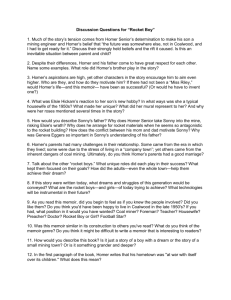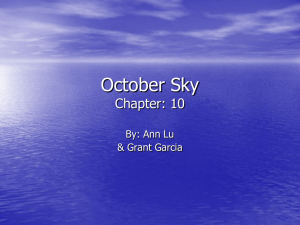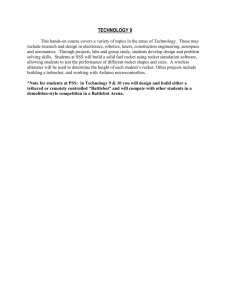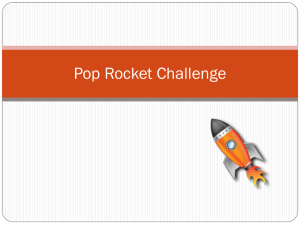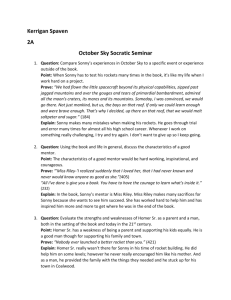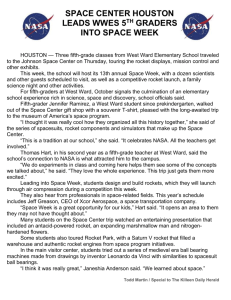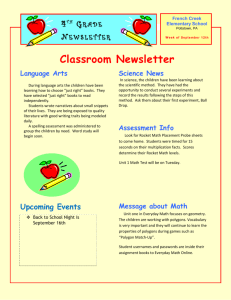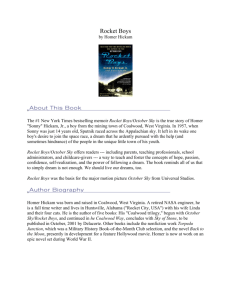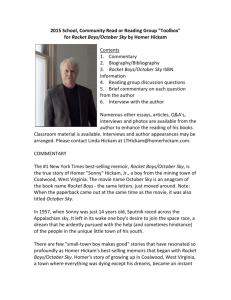Rocket Boys Worksheet: Themes, Characters, and Analysis
advertisement
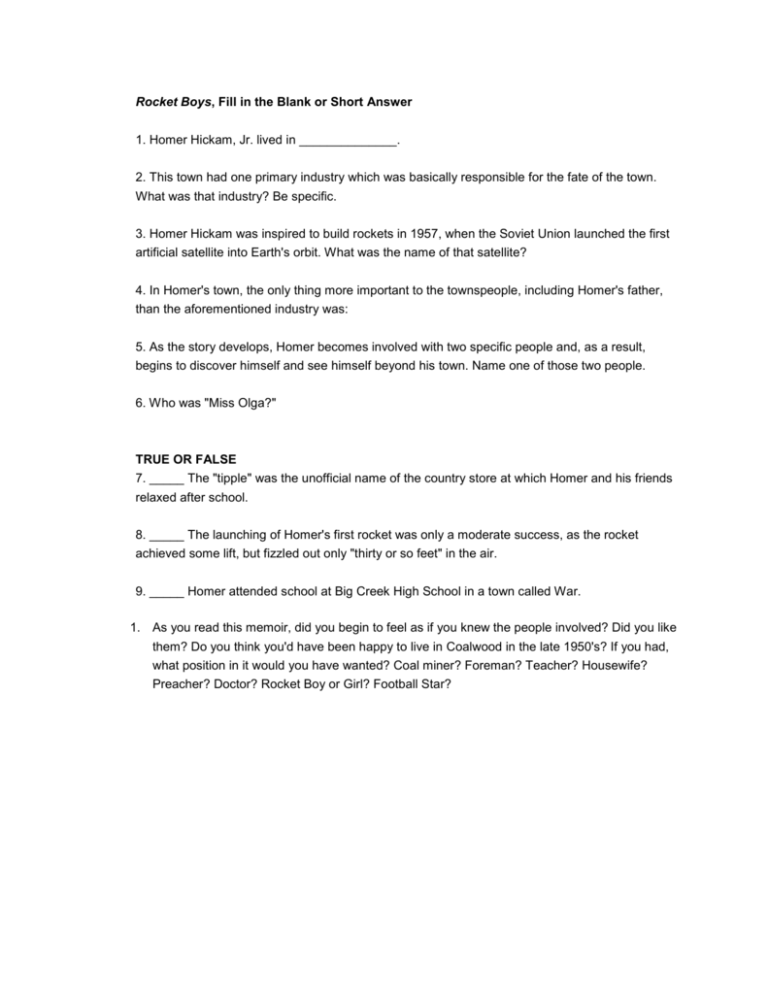
Rocket Boys, Fill in the Blank or Short Answer 1. Homer Hickam, Jr. lived in ______________. 2. This town had one primary industry which was basically responsible for the fate of the town. What was that industry? Be specific. 3. Homer Hickam was inspired to build rockets in 1957, when the Soviet Union launched the first artificial satellite into Earth's orbit. What was the name of that satellite? 4. In Homer's town, the only thing more important to the townspeople, including Homer's father, than the aforementioned industry was: 5. As the story develops, Homer becomes involved with two specific people and, as a result, begins to discover himself and see himself beyond his town. Name one of those two people. 6. Who was "Miss Olga?" TRUE OR FALSE 7. _____ The "tipple" was the unofficial name of the country store at which Homer and his friends relaxed after school. 8. _____ The launching of Homer's first rocket was only a moderate success, as the rocket achieved some lift, but fizzled out only "thirty or so feet" in the air. 9. _____ Homer attended school at Big Creek High School in a town called War. 1. As you read this memoir, did you begin to feel as if you knew the people involved? Did you like them? Do you think you'd have been happy to live in Coalwood in the late 1950's? If you had, what position in it would you have wanted? Coal miner? Foreman? Teacher? Housewife? Preacher? Doctor? Rocket Boy or Girl? Football Star? 2. Was this memoir similar in its construction with others that you've read? What do you think of the memoir genre? Do you think it might be difficult to write a memoir that is interesting to readers? 3. How would you describe this book? Would you call is a man's book or a woman's book? Were you fearful it might be too technical? Is it just a story of a boy with a dream or the story of a small mining town? Or is it something grander and deeper? 4. Do you think Homer Senior and Elsie love each other? What is the principle cause of their conflicts? What is the importance of the mural Elsie is painting in the kitchen? Why is Homer Junior called "Sonny" in the book? Why did his teachers insist on calling him by that nickname rather than the one his mother wanted? 5. How would you describe Sonny's father? Why does Homer Senior take Sonny into the mine, risking Elsie's wrath? Why does he arrange for rocket materials when he seems so antagonistic to the rocket building? How does the conflict between his mom and dad motivate Sonny? Why was Geneva Eggers so important in Sonny's understanding of his father? . 6. In the first paragraph of the book, Homer writes that his hometown was "at war with itself over its children." What does this mean? 7. All the women in Coalwood are shown to be strong women, a trait they must have to say goodbye daily to their husbands and sons who work in the dangerous mine and may not return that night. Although most of the women of Coalwood make the best of their lot, they want a better life for their children. How can they help this to happen? Are they feminists before the term existed? How about the teachers called "The Great Six?" What's their role in Coalwood? What is your opinion of Elsie, Sonny's mother? Is she too harsh with her husband in her attempt to better her life and that of her sons? And Miss Riley? What did it say about her when she stood up for the Rocket Boys against the feared principal, Mr. Turner? 8. Is this a universal story? Could it be set in other times or is it specific to Coalwood and West Virginia in the late 50's? The book has been translated into eight languages and people from all over the world say Homer "told their story" yet they have never held a rocket or even seen a coal mine! The book is dedicated "To Mom and Dad and the people of Coalwood." Why do you think Homer made that dedication? 9. Many schools from fifth grade to college are studying Rocket Boys/October Sky in their classrooms, including English, math, and science classes. That makes it a pretty unique book! This is an adult book but it is told from a young man's point of view. Why do you think teachers are picking this book to study and why are they writing Homer that they think it was their most popular class read ever, sparking the most thoughtful discussion? 10. This story is also about the rewards and costs of nonconformity. Who conforms, who doesn't and what is the consequence of their actions? Is that a problem today and can this story help those who tend to go against the expected norms? How was Quentin a nonconformist? How about the other boys? 11. In Chapter 22, Mr. Turner, the Big Creek High School principal, wryly tells Sonny, "In the queer mass of human destiny, the determining factor has always been luck." But in Chapter 26, Homer writes, "There's a plan. If you are willing to fight hard enough, you can make it detour for a while, but you're still going to end up where God wants you to be." Are these quotations about human fate really in conflict with each other? How do they apply to the story? This is one of those underlying themes to the book, that destiny is one of life's grandest mysteries. 12. Rocket Boys/October Sky is an excellent way to think about and discuss the many steps it takes to achieve a goal. Sonny's idea of building rockets starts as simply a dream, but then he brings in the other boys and even approaches Quentin, the school outcast. The Rocket Boys first look upon their rocket-building as interesting and fun but then it becomes a challenge to defy expectations. Only much later does the idea of entering the science fairs occur to them. Discuss the importance of incremental steps in your life. Do you believe an incremental approach has validity in all walks of life, academic and otherwise? Why does Quentin believe in the necessity of obtaining what he calls a "body of knowledge?" Homer now gives motivational speeches citing "Passion, Planning, and Perseverance" as the secret to a successful life. He stresses that planning in a sequential, incremental way is very important in reaching your dreams. 13. Miss Riley, the physics teacher, seems to regard education as a challenge and adventure. Sonny rises to meet the formidable task she sets before him. He writes, "I had discovered that learning something, no matter how complex, wasn't hard when I had a reason to want to know it." (p. 168) That challenge is taken to the next level by Miss Riley when she gives him the book Principles of Guided Missile Design, saying, ³All I've done is give you a book. You have to have the courage to learn what's inside it.² (p. 232). Discuss Miss Riley's motivational techniques. 14. When Sonny thinks of giving up rocketry altogether, Miss Riley tells him: "You've got to put all your hurt and anger aside so that you can do your job . . . Your job, Sonny, is to build your rockets." When Sonny asks why that's so important, she answers, "If for no other reason, because it honors you and this school."(p. 296). It's clear that she means it also honors Coalwood. Discuss the concept of civic pride. How do the Rocket Boys help the town? Why are they celebrated in the newspapers? In church? In the Big Store? By both sides of the unionization conflict? Why do so many attend their rocket launches? Is it just because the football team is on year-long suspension? 15. Discuss the motivational aspects contained within this story. How did Sputnik motivate Sonny? Is his mother trying to be motivational after he blows up her rose garden fence with his first rocket ("I believe you can build a rocket. [Your father] doesn't. I want you to show him I'm right." (p. 52)) Early in his career as a rocket builder, Rocket Boy O'Dell says, "A rocket won't fly unless someone lights the fuse." (p. 105) How important is it to find motivation in all our endeavors? Would the boys have gotten to the science fair without being motivated by something larger than themselves? 16. The final chapter in the book (before the epilog) finishes with the launch of the last rocket of the Big Creek Missile Agency. Homer Senior is invited to launch this rocket. Why do you think this invitation was made? Why do you think he accepted? 1. Members of the Rocket Boys group were ___________, ____________, __________, __________, __________, and _________. 2. The shaft used for lifting, sorting, and dumping coal was called the _______. 3. The writer played the _______in the school band. 4. The title of the book Miss Riley gave the writer was __________________. 5. ____________ surprised everyone by signing up for the calculus class. 6. The kids' hangout in the basement of the Owl's Nest was named the ______. 7. The writer met __________, a Democratic Presidential candidate. 8. Quentin liked to use the word _________ for anything he liked. 9. __________ was the leader of the miners' union. 10. __________died in a mining accident that made the writer quit building rockets. 11. The baby saved by the writer's father was ___________. 12. __________ like to flirt with the writer. 13. The writer's first rocket ripped out his mother's _________ fence. 14. The rocket boys named their rockets ___________. 15. The nickname for the teachers who supported the rocket boys was the Great _____________. 16. The writer first bought a/an __________ (color) suit for the National Science Fair. 17. The writer used a _______ to get to school on a snow day. 18. __________ placed a "No Trespassing" sign at Cape Coalwood. 19. Miss Riley died in 1969 from __________ Disease. 20. The last rocket fired by the rocket boys went almost ______ miles up.

